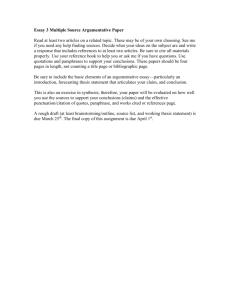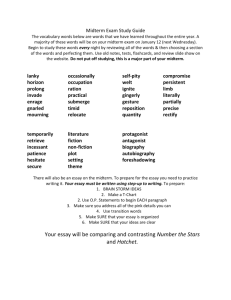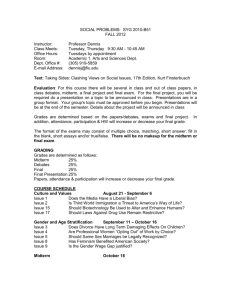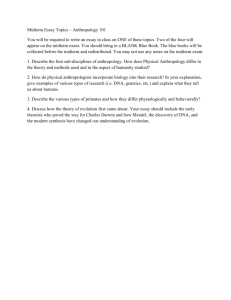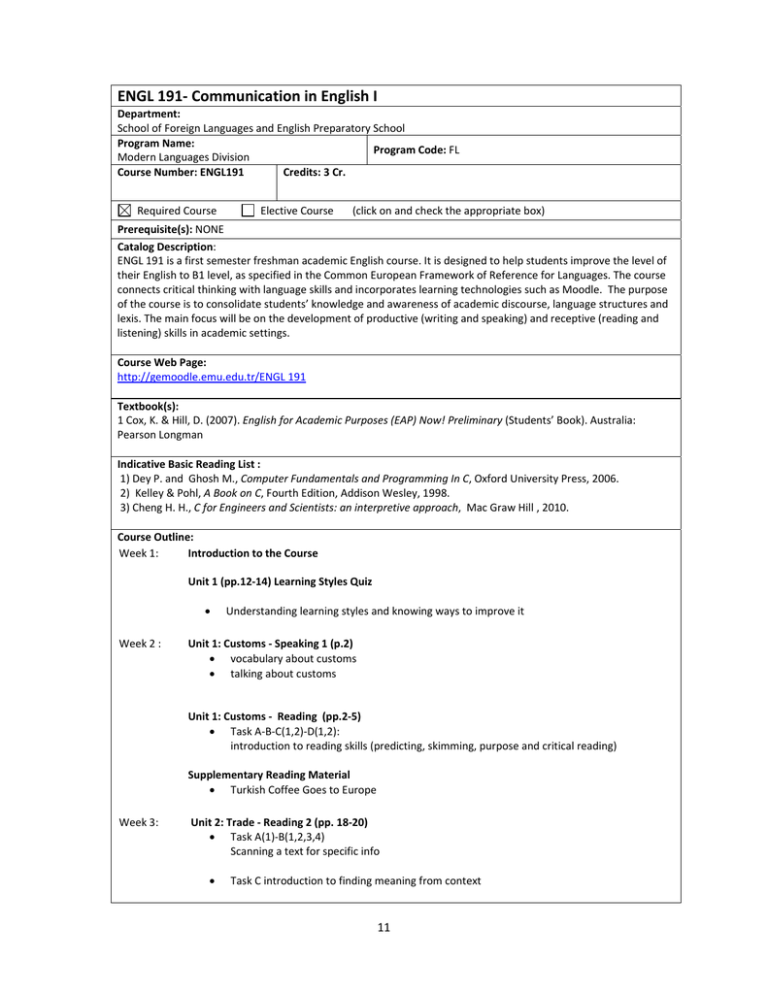
ENGL 191‐ Communication in English I
Department: School of Foreign Languages and English Preparatory School Program Name: Program Code: FL Modern Languages Division Course Number: ENGL191 Credits: 3 Cr.
Required Course Elective Course (click on and check the appropriate box) Prerequisite(s): NONE Catalog Description: ENGL 191 is a first semester freshman academic English course. It is designed to help students improve the level of their English to B1 level, as specified in the Common European Framework of Reference for Languages. The course connects critical thinking with language skills and incorporates learning technologies such as Moodle. The purpose of the course is to consolidate students’ knowledge and awareness of academic discourse, language structures and lexis. The main focus will be on the development of productive (writing and speaking) and receptive (reading and listening) skills in academic settings. Course Web Page: http://gemoodle.emu.edu.tr/ENGL 191 Textbook(s): 1 Cox, K. & Hill, D. (2007). English for Academic Purposes (EAP) Now! Preliminary (Students’ Book). Australia: Pearson Longman Indicative Basic Reading List : 1) Dey P. and Ghosh M., Computer Fundamentals and Programming In C, Oxford University Press, 2006. 2) Kelley & Pohl, A Book on C, Fourth Edition, Addison Wesley, 1998. 3) Cheng H. H., C for Engineers and Scientists: an interpretive approach, Mac Graw Hill , 2010. Course Outline: Week 1: Introduction to the Course
Unit 1 (pp.12‐14) Learning Styles Quiz Understanding learning styles and knowing ways to improve it Week 2 : Unit 1: Customs ‐ Speaking 1 (p.2)
vocabulary about customs talking about customs Unit 1: Customs ‐ Reading (pp.2‐5) Task A‐B‐C(1,2)‐D(1,2): introduction to reading skills (predicting, skimming, purpose and critical reading) Supplementary Reading Material Turkish Coffee Goes to Europe Week 3: Unit 2: Trade ‐ Reading 2 (pp. 18‐20)
Task A(1)‐B(1,2,3,4) Scanning a text for specific info Task C introduction to finding meaning from context 11 Week 4: Week 5: Week 6 : Week 7: Week 8: Task D tracking participants and Task E five questions Unit 3: Demographics ‐ Speaking 1 (p.28)
Tasks A and B discussion and vocabulary about societies and people Unit 3: Demographics ‐ Reading (pp.28‐30) Task A pre‐reading discussion Task B predicting from the introduction Task C finding meaning from context\ Task E discussion Unit 5: Communication ‐ Speaking 1 (p.52)
Task A # 1, 2 types of communication Unit 5: Communication ‐ Reading (pp.52‐55) Tasks A‐E reading for main ideas and reading for detail Unit 6: Politics ‐ Speaking 1 (pp.64‐65)
Tasks A thinking for yourself and talking about it Unit 6: Politics ‐ Speaking 2 (p.70) Task A agreeing and disagreeing Unit 6: Politics Reading (pp.66‐67)
Tasks A & B features of individual paragraphs in larger context Supplementary Reading Material
Exam Fitness Week 9‐10: Midterm Exam Week Week 11: Feedback on Midterm Exam
Argumentative Essay Writing Input Argumentative Essay Writing – Outline Input Week 12: Argumentative Essay Writing – First Draft Input
Week 13: Presentation Skills Preparing an Outline Language used in Presentations Guidelines for Presentations Week 14: Student Presentations Week 15: Student Presentations (Cont.) Week 15‐16: Final Exam Week Course Learning Outcomes: On successful completion of this course, all students will have developed knowledge and understanding of: understand the basic terminology used in computer programming write, compile and debug programs in C language use different data types in a computer program design programs involving decision structures, loops and functions explain the difference between call by value and call by reference 12
understand the dynamics of memory by the use of pointers create and use different data structures On successful completion of this course, all students will have developed their skills in: (a)
using the Visual Studios C++ Editor/Compiler Class Schedule: Laboratory Schedule: 4 hrs of lectures per week 2 hrs of laboratory per week Method No
Percentage
Midterm Exam(s) 1
25%
Lab Work(s) 7
20 %
Assessment Quiz(es) 3‐4
15 %
Homework(s) 4
5%
Final Examination 1
35%
Contribution of Course to Criterion 5 Credit Hours for: Mathematics & Basic Science : 0 Engineering Design : 0 General Education : 3 Relationship of Course to Program Outcomes
The course has been designed to contribute to the following program outcomes: (a) an understanding of professional and ethical responsibility, (b ) an ability to communicate effectively, (c ) a recognition of the need for, and an ability to engage in life‐long learning, (d) capability of independent learning as a consequence of laboratory and field research and competitions on design experiences. (e) an ability to communicate in a bilingual environment. Prepared by: Nihan K. Benlioglu Date Prepared: 31 May 2010 13

